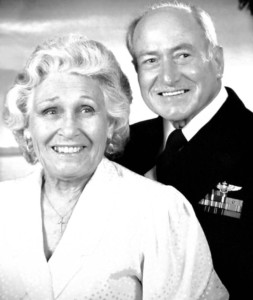USCG Commander (Ret.) Stewart R. Graham Sr., 99
NAPLES — Stewart Ross Graham Sr., 99, was born to William Moutrie and Edith Stewart Graham, in Brooklyn, N.Y., on Sept. 25, 1917.
He shared this nest with three other siblings that have since passed before him (Betty, Douglas and Archie). He met the love of his life, Thomasina (Mae) Rana and, with smiles on their faces and a twinkle in their eyes, they married on May 24, 1942. Sons Stewart Ross Jr. (1946) and William Peter (1950) soon became a part of their extensive families.
He had joined the U.S. Coast Guard (as an enlisted man) but quickly rose through the ranks to Commander. He, Mae and the boys endured, and enjoyed, numerous transfers around the country, finally settling in at Naples, Maine upon his retirement (1960), after 24 years of service. He and Mae offered endless love, rugged support, copious food and drinks (“how-aboutsâ€) to the endless flow of family and friends that came through their doors. Sadly, Mae passed away on Sept. 27, 2014. The man she lived, loved and laughed with joined her on Saturday, Aug. 13, 2016, at home with his family at his side.
Stewart was a busy young man in his service with the Coast Guard and is nationally-recognized as a pioneer in rotary wing (helicopter) flight. Some of the highlights of his career included:
Sept. 15, 1946 — The world’s first major airline crash found him flying an early model Sikorsky helicopter, rescuing survivors from an inaccessible site. For his actions, he was commissioned “A Knight of the Order of Leopold†by the Belgium government.
He had the designation of Coast Guard Aviator #114 and USCG and Navy helicopter pilot #2, compiling many “firsts†following his three hours of instruction on how to fly helicopters at the Sikorsky factory in 1943 — He made the first helicopter antisubmarine warfare patrol flying against the German U-Boat threat from a British freighter in convoy (Jan., 1944). He, and a Royal Air Force pilot flew from a makeshift flight deck, on a stormy N. Atlantic crossing, proving the usefulness of the helicopter to the Navy in 1951. He became a tactical instructor shortly thereafter.
As the Coast Guard was under the Dept. of the Navy during war, he was the first test pilot for helicopters. Along with his mentor, Commander Frank Erickson, he established the “Rotary Wing Development Unit†at the U.S. Coast Guard station in Elizabeth City, N.C. in 1946. The team imagined, and created, much of the rescue equipment, helicopter design, and tactics still used today by modern helicopter crews. These include such innovations as the hydraulic hoist and rescue basket for survivor retrieval. These first humanitarian services, dubbed the still largely-unknown helicopter as “hovering angels†put the Coast Guard in the rescue business by 1946.
He was the first to carry helicopter airmail to the N. Carolina Outer Banks villages.
Dec. 1947 — He was the first to employ a nighttime medical evacuation, by helicopter, when they were not even equipped for night flying.
For a week, in 1948, he performed helicopter demonstration flights for the opening ceremonies of the NY new Idlewild Airport (now JFK).
Mar. 1949 — He flew solo the 3,900-mile trip from Elizabeth City, N.C., to Port Angeles, Wash., after a 56-hour flight time, in just 10 and a half days.
Ten years later (1959), he provided the helicopter escort for the Queen of England, on the HMS Britannia, during the dedication of the St. Lawrence Seaway, from Buffalo, N.Y., to Chicago, Ill.
Jan. 1955 — He flew the first recorded night hoist, in the Gulf of Mexico, retrieving three survivors of a shipwreck.
Stew’s pioneering efforts in helicopters resulted in the rescue of thousands of people in distress around the globe over the past 70 years. He helped prove the value of the helicopter as a revolutionary aircraft through his own imagination, tenacity and exceptional skills.
Commander Graham was recognized for his contribution to aviation in the Coast Guard Aviation Hall of Honors in 1995 and in the U.S. Naval Aviation Hall of Honor in 2004. During his career, he received the Distinguished Flying Cross, two Air Medals, Knighthood by the Belgium government and numerous other awards for helicopter development.
He was a man of many achievements but he would count the greatest of these the love and admiration of his numerous friends and family members. He, and Mae, will never be forgotten and always fondly remembered by those who were privileged to have known and loved them.
They are survived by their sons: Ross of Naples, Bill (Linda) of Jacksonville, Ore.; grandsons Alan of N. Conway, N.H., and Michael (Jennifer) with great-grandsons Luke and Liam of Central Pt., Ore.; along with too many wonderful family and friends to be included in this announcement.
No funeral is planned. A USCG and private family memorial, at Arlington National Cemetery, is to be planned at a future date. Donations to favorite charities are always encouraged and appreciated in lieu of flowers.


